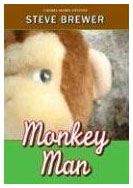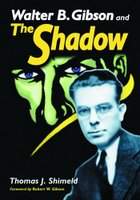In the individual categories, this year’s winners were:
• The Macavity Awards
The Macavitys are given out by Mystery Readers International. Members of that organization both nominate contenders and choose the winners.
 Best Novel: The Lincoln Lawyer, by Michael Connelly (Little, Brown)
Best Novel: The Lincoln Lawyer, by Michael Connelly (Little, Brown)Also nominated: One Shot, by Lee Child (Delacorte Press); The James Deans, by Reed Farrel Coleman (Plume); Vanish, by Tess Gerritsen (Ballantine Books); Strange Affair, by Peter Robinson (Morrow); The Power of the Dog, by Don Winslow (Knopf); and Solomon vs. Lord, by Paul Levine (Bantam)
Best First Novel: Immoral, by Brian Freeman (St. Martin’s Minotaur)
Also nominated: All Shook Up, by Mike Harrison (ECW Press); The Baby Game, by Randall Hicks (Wordslinger Press); and The Firemaker, by Peter May (St. Martin’s Minotaur)
Best Non-fiction: Girl Sleuth: Nancy Drew and the Woman Who Created Her, by Melanie Rehak (Harcourt)
Also nominated: Tracks to Murder, by Jonathan Goodman (Kent State University); Behind the Mystery: Top Mystery Writers Interviewed, by Stuart M. Kaminsky, photography by Laurie Roberts (Hothouse Press); The New Annotated Sherlock Holmes: The Novels, edited by Leslie S. Klinger (Norton); and Spook: Science Tackles the Afterlife, by Mary Roach (Norton)
Best Short Story: “There Is No Crime on Easter Island,” by Nancy Pickard (Ellery Queen Mystery Magazine [EQMM], September-October 2005)
Also nominated: “It Can Happen,” by David Corbett (in San Francisco Noir, edited by Peter Maravelis; Akashic Books); “Everybody’s Girl,” by Robert Barnard (EQMM, May 2005); and “The Big Road,” by Steve Hockensmith (Alfred Hitchcock’s Mystery Magazine [AHMM], May 2005)
Sue Feder Historical Mystery Award: Pardonable Lies, by Jacqueline Winspear (Henry Holt)
Also nominated: In Like Flynn, by Rhys Bowen (St. Martin’s Minotaur); Spectres in the Smoke, by Tony Broadbent (St. Martin’s Minotaur); The War of the World Murder, by Max Allan Collins (Berkley Prime Crime); and Night’s Child, by Maureen Jennings (McClelland and Stewart)
* * *
• The Shamus AwardsShamuses are presented by the Private Eye Writers of America (PWA) and honor excellence among works in the private-eye genre.
Best Hardcover: The Lincoln Lawyer by Michael Connelly (Little, Brown)
Also nominated: Oblivion, by Peter Abrahams (Morrow); The Forgotten Man, by Robert Crais (Doubleday); In a Teapot, by Terence Faherty (Crum Creek Press); The Man with the Iron-On Badge, by Lee Goldberg (Five Star); and Cinnamon Kiss, by Walter Mosley (Little, Brown)
Best Paperback Original: The James Deans, by Reed Farrel Coleman (Plume)
Also nominated: Falling Down, by David Cole (Avon); Deadlocked, by Joel Goldman (Pinnacle); Cordite Wine, by Richard Helms (Back Alley Books); and A Killing Rain, by P.J. Parrish (Pinnacle)
Best First Novel: Forcing Amaryllis, by Louise Ure (Mysterious Press)
Also nominated: Blood Ties, by Lori G. Armstrong (Medallion), Still River, by Harry Hunsicker (Thomas Dunne/St. Martin’s Minotaur); and The Devil’s Right Hand, by J.D. Rhoades (St. Martin’s Minotaur)
Lifetime Achievement Award: Max Allan Collins
* * *
• The Barry AwardsThe winners in this category are selected by the readers of Deadly Pleasures magazine:
Best Novel: Red Leaves, by Thomas H. Cook (Harcourt)
Also nominated: Bloodlines, by Jan Burke (Simon & Schuster); Mercy Falls, by William Kent Krueger (Atria); Sudden Death, by David Rosenfelt (Mysterious); Mr. Lucky, by James Swain (Ballantine); and The Power of the Dog, by Don Winslow (Knopf)
Best First Novel Published in the U.S. in 2005: Cold Granite, by Stuart MacBride (St. Martin’s Minotaur)
Also nominated: Die a Little, by Megan Abbott (Simon & Schuster); Immoral, by Brian Freeman (St. Martin’s Minotaur); The Baby Game, by Randall Hicks (Wordslinger Press); Dark Harbor, by David Hosp (Warner); and The Firemaker, by Peter May (St. Martin’s Minotaur)
Best British Novel Published in the U.K. in 2005: The Field of Blood, by Denise Mina (Bantam Press)
Also nominated: The Blood-Dimmed Tide, by Rennie Airth (Macmillan); Lifeless, by Mark Billingham (Little, Brown UK); Silence of the Grave, by Arnaldur Indridason (Harvill); A Good Day to Die, by Simon Kernick (Bantam Press); and Lost, by Michael Robotham (Time Warner)
Best Thriller: Company Man, by Joseph Finder (St. Martin’s Minotaur)
Also nominated: Consent to Kill, by Vince Flynn (Atria); The Inside Ring, by Michael Lawson (Doubleday); Seven Deadly Wonders, by Matthew Reilly (Simon & Schuster); Map of Bones, by James Rollins (Morrow); and Private Wars, by Greg Rucka (Bantam)
Best Paperback Novel: The James Deans, by Reed Farrel Coleman (Plume)
Also nominated: Six Bad Things, by Charlie Huston (Ballantine); Night’s Child, by Maureen Jennings (McClelland & Stewart); Now You See Me, by Rochelle Krich (Ballantine); The Dead Don’t Get Out Much, by Mary Jane Maffini (Napoleon Publishing); and Inside Out, by John Ramsey Miller (Dell)
Best Short Story: “There is No Crime on Easter Island” by Nancy Pickard (EQMM, September-October 2005)
Also nominated: “The Big Road,” by Steve Hockensmith (AHMM, May 2005); “Needle Match,” by Peter Lovesey (from Murder Is My Racket, edited by Otto Penzler; Mysterious Press); “Love and Death in Africa,” by Joan Richter (EQMM, January 2005); “The Method in Her Madness,” by Tom Savage (AHMM, June 2005)
Don Sandstrom Memorial Award for Lifetime Achievement in Mystery Fandom: Janet A. Rudolph
* * *
Finally, the American Crime Writers League announced that Chicago Tribune critic (and sometime Rap Sheet contributor) Dick Adler is the recipient of this year’s Ellen Nehr Award for mystery reviewing.(Hat tip to Lesa Holstein.)





































